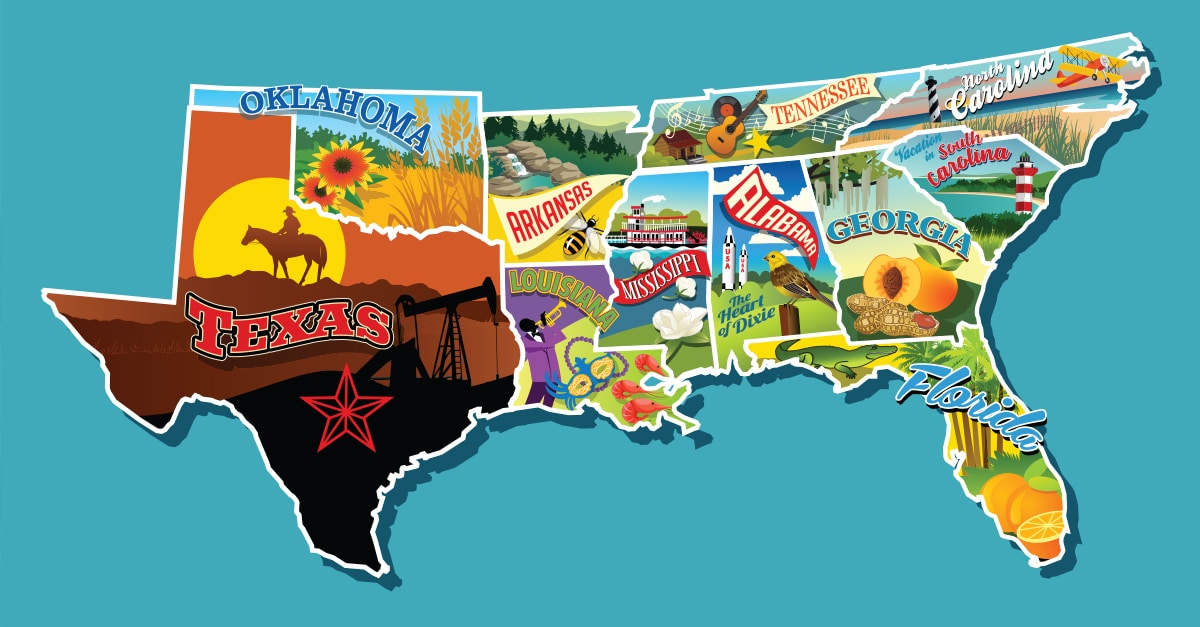
People the world over have probably heard Southern accents and dialects in movies or TV shows. But did you know that there are actually several variations of English in the Southern U.S.? Even as regional accents and dialects fade away across the U.S., the richness and variety of how people speak around the South tells you a lot about their history and culture.
Whether you’re an expat seeking to better understand the people in your new home or you’re just fascinated by accents and dialects (like we are at Fluency Corp!), let’s go on a quick linguistic tour around the American South.
Accents vs. Dialect
Before we get started, we want to share a quick note about the terminology used in this article. What we typically think of as a regional accent is actually a blend of accent and dialect. An accent is how people in a particular region pronounce words. A region’s dialect includes its distinct accent, but also features like word choice and sentence structure.
Please remember that you’re likely to hear people with different accents or dialects within the same state or region. (For example, not all Texans say “howdy.”) In this article, we’re simply giving an overview of some of the best-known accents around the South.
Texas Accent/Dialect
We’ll start our tour here because Texas is the state where Fluency Corp is based. We have to confess to you, however, that some people don’t even consider Texas part of the South. What everyone agrees on, though, is that Texans have their own ways of speaking.
Sociolinguist Guy Bailey once said that Texans have a “Southern accent with a twist.” According to the University of Texas, you might hear Texans (and other Southerners) pronounce the word “pie” as “pah” and “night” as “naht.”
Texans are also known for colorful expressions and sayings, like “I wouldn’t trust him any farther than I could throw him.”
Louisiana Accent/Dialect
Next, let’s visit Texas’ neighbor to the east, Louisiana. This state’s speech style is also well known, thanks in part to the French influence on Louisiana. What most of us would identify as a Louisiana accent is actually the accent of the Southern part of the state, including New Orleans. People in this part of the state often identify as Cajuns or Creoles.
If you’ve ever heard New Orleans football fans chant “Who dat! Who dat! Who dat say dey gonna beat dem Saints!”, you have a head start on speaking Cajun English. Other familiar terms in this dialect include “gris-gris” (a Voodoo charm), “cher” (dear or darling) and, of course, a whole passel of culinary words like “gumbo” and “roux.”
North Florida Accent/Dialect
There’s an old saying that the farther north you go in Florida, the more Southern things feel. While Florida cities like St. Petersburg, Orlando and Miami are in the southern part of the U.S. geographically, they aren’t as closely connected to the traditional culture of the South as places like Tallahassee and the Florida Panhandle are.
Around those parts, you might hear a slow-paced Southern accent and the use of idioms like “fixin’ to.” (“I’m fixin’ to go to the store. Do y’all need anything?”)
Appalachian Accent/Dialect
Contrary to stereotypes, all of Appalachia isn’t the American South. The Appalachian Regional Commission defines Appalachia as all of West Virginia, plus parts of Alabama, Georgia, Kentucky, Maryland, Mississippi, New York, North Carolina, Ohio, Pennsylvania, South Carolina, Tennessee and Virginia.
But Appalachian English is most commonly associated with the southern and central parts of this region. The Scots-Irish influence on Appalachian English is strong and can be heard in words like “holler” and “ruckus.”
Arkansas Ozarks Accent/Dialect
This is another accent that has rich cultural ties. Like Appalachian English, Ozark English has ties to Scotch-Irish dialects. In isolated Ozark communities, researchers have even heard residents speak a dialect that has a lot in common with the English of Chaucer’s time.
One common colloquialism that characterizes Ozark English is using “done” to mean “already,” as in “I done told you.” Speakers of Ozark English also sometimes use “a-” as a verb prefix. For example: “He just kept a-goin’.”
Southern Coastal Accent/Dialect
Like the Appalachian accent, the Southern coastal accent can be heard in multiple states. Associated with parts of Georgia, South Carolina and Florida, the coastal accent is characterized more by drawl than twang. It’s also known for its slower pace and softening of consonants.
Many people have described this accent as sounding refined or genteel. In some areas, you’ll also hear the influence of the Gullah Geechee culture on the Southern coastal accent.
Mississippi Delta Accent/Dialect
And speaking of drawls, y’all, let’s discuss the Mississippi Delta accent. The Delta is a region that’s known for its (sometimes painful) history and that includes the northwest part of Mississippi and parts of Arkansas and Mississippi. In the Delta, you might hear people call crackers “nabs” and dive bars with good music “juke joints.”
Are You an Expat in the U.S. Looking to Sound More Like a Native Speaker?
If you’re an expat in the U.S. who wants to sound more like the native English speakers where you live, we’d love to tell you about our English classes at Fluency Corp. If you’d like to learn more about how our classes work, contact us now.










